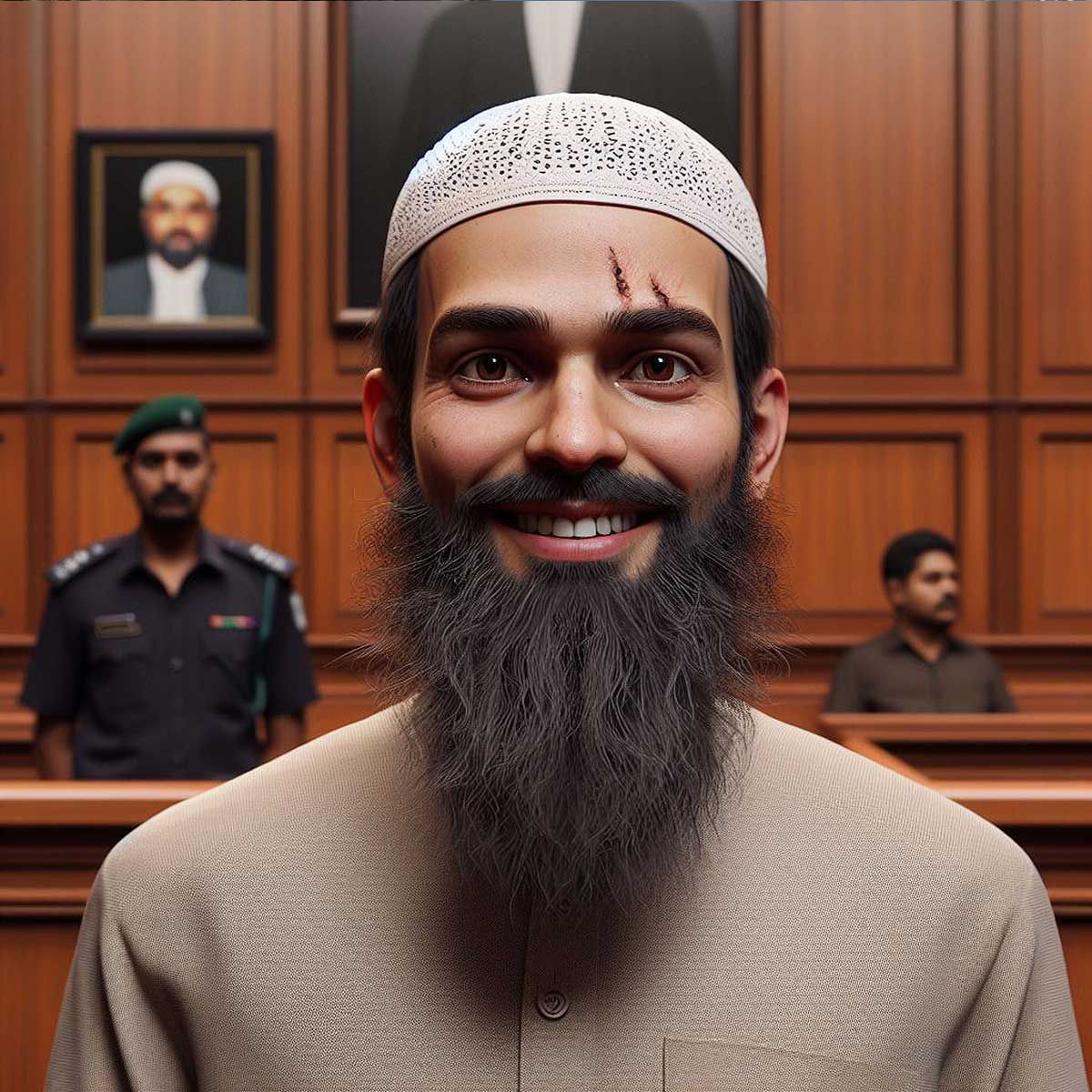More Coverage
Twitter Coverage
JOIN SATYAAGRAH SOCIAL MEDIA
"अरे क्या वकील साब, इतना तो चलता है": In a recent judgment, Madras High Court redefines terrorism; granting bail to UAPA accused Asif Mustahin who expresses desire to join IS, ‘Planning to kill Hindu leaders from BJP, RSS cannot be called a terrorist act’

In a significant judicial pronouncement, the Madras High Court has made a statement that has stirred considerable discussion and debate. On Wednesday, 13th December, the court expressed an opinion that has resonated deeply within legal and political circles. The High Court observed that the planned assassination of Hindu leaders from political and social organizations like the BJP and RSS cannot be classified as a terrorist act. This viewpoint was articulated during the proceedings related to the bail application of one Asif Mustahin.
|
Asif Mustahin, who had been arrested under the stringent Unlawful Activities (Prevention) Act (UAPA), found relief in the court's interpretation of what constitutes an act of terrorism. According to section 15 of the UAPA, an act of terrorism is defined in certain terms which, as per the High Court's observation, do not encompass the planned killing of Hindu leaders.
The court's decision to grant bail to Mustahin under these circumstances marks a crucial moment in the interpretation of anti-terrorism laws in India. It raises vital questions about the scope and application of the UAPA, particularly concerning acts targeted against individuals belonging to specific political or social groups.
The judgment, while specifically addressing Mustahin's case, touches upon broader issues of how terrorism is defined and understood within the Indian legal framework. It challenges the conventional perceptions of what actions constitute terrorism, especially in the context of politically or ideologically motivated violence.
This High Court's stance, therefore, is not just about the bail of an individual accused under the UAPA but is also about how the judiciary interprets and applies laws related to terrorism.
the Madras High Court, comprising a division bench of Justices S S Sundar and Sunder Mohan, delivered a statement on Wednesday that has sparked intense scrutiny and criticism. The court remarked, “The evidence discloses that the conspiracy was to attack certain religious leaders. The authorities have not spelt out how that would amount to a terrorist act, as defined under section 15 of the UAPA.” This statement was made in the context of granting bail to Asif Mustahin, an individual arrested under the Unlawful Activities (Prevention) Act (UAPA).
The bench's observation raises critical questions regarding the interpretation of what constitutes a 'terrorist act'. According to the court, the evidence suggested a plot to target specific religious (Hindu) leaders, yet it found that the prosecution failed to convincingly demonstrate how this plot aligns with the legal definition of terrorism under section 15 of the UAPA.
|
This decision to grant bail to Asif Mustahin, who was taken into custody on 26th July 2022 by the National Investigation Agency (NIA) for his alleged role in these criminal activities, has been met with sharp criticism. Critics argue that the court's narrow interpretation of the UAPA undermines the severity and potential impact of such plots. Targeting Hindu leaders, particularly from prominent organizations like the BJP and RSS, can incite communal tension and violence, which is a core aspect of many terrorist activities.
Furthermore, the judgment raises concerns about the precedent it sets for future cases involving similar charges. By implying that the targeted killing of Hindu leaders does not necessarily constitute a terrorist act under the UAPA, the court may inadvertently diminish the seriousness of such conspiracies. This could lead to a dangerous leniency in dealing with cases that, although not fitting the court's interpretation of terrorism, pose significant threats to public safety and social harmony.
Critics of this judgment emphasize the importance of a broader and more comprehensive understanding of terrorism, one that recognizes the varied forms it can take. In a diverse and complex society like India, any act that targets individuals or groups based on their religious identity and has the potential to disrupt communal peace should be treated with the utmost seriousness.
The court stated, “To bring an act under section 15 of the UAPA, the act must be done with an intent to threaten or likely to threaten the unity, integrity, security, economic security, or sovereignty of India, or with an intent to strike terror or likely to strike terror in the people or any section of the people in India or any foreign country.” This definition was central to their decision to grant bail to Mustahin.
|
Critics argue that the court's interpretation is overly narrow and fails to consider the broader context of terrorism and its impact on society. The idea that an act must directly threaten national integrity or sovereignty to qualify as terrorism under the UAPA overlooks the subtler, yet equally destructive, ways in which terrorism operates. Acts such as targeting specific religious leaders can significantly destabilize social harmony and incite communal violence, which indirectly threatens national security.
Mustahin's bail applications were previously rejected by the trial court, the high court, and the Supreme Court, which indicates the serious nature of the charges against him. He remained in custody for the last 17 months, reflecting the gravity of the allegations. According to the prosecution, Mustahin expressed a desire to join the Islamic State (IS) and established connections with another accused, who is affiliated with a global terror organization. Furthermore, it was alleged that they conspired to assassinate Hindu religious leaders from the BJP and RSS.
The fact that Mustahin's intent and actions were linked to an international terror organization and targeted specific religious groups should have been a significant factor in the court's decision. Critics believe that the court's focus on a narrow interpretation of the UAPA overlooks the broader implications of such actions. The targeting of religious leaders is a well-known tactic used by terror groups to create fear and division within communities.
The bench, disagreeing with the prosecution's arguments, stated that there was no evidence to suggest that Mustahin had joined the Islamic State (IS) or that the second accused was a member of the terror group. The court further noted, “Even assuming that the materials collected by the prosecution might ultimately lead to a conviction, the detention pending trial could not be indefinite.”
 |
This assertion by the bench has been met with criticism for several reasons. Firstly, the seriousness of the charges under the UAPA, especially in cases involving potential links to terror groups like IS, warrants a more cautious approach to granting bail. The decision to release an accused on bail in such a context risks sending a message that the judicial system may not be fully recognizing the severity and potential threat posed by individuals charged under this act.
Moreover, critics argue that the court's stance on the indefinite detention pending trial seems to overlook the complexities involved in investigating and prosecuting cases related to terrorism. These cases often require extensive time to gather and analyze evidence, given their intricate nature and the involvement of international terror networks.
The court provided the accused with conditional bail, instructing him to reside in Erode and attend the trial court daily at 10:30 am until further notice. While these conditions aim to ensure the accused's presence during the trial process, critics express concern that such measures may not be sufficient to mitigate the risks associated with releasing someone accused of such serious offenses. There is a worry that this could potentially compromise public safety or disrupt the ongoing investigation.
 |
 Support Us
Support Us
Satyagraha was born from the heart of our land, with an undying aim to unveil the true essence of Bharat. It seeks to illuminate the hidden tales of our valiant freedom fighters and the rich chronicles that haven't yet sung their complete melody in the mainstream.
While platforms like NDTV and 'The Wire' effortlessly garner funds under the banner of safeguarding democracy, we at Satyagraha walk a different path. Our strength and resonance come from you. In this journey to weave a stronger Bharat, every little contribution amplifies our voice. Let's come together, contribute as you can, and champion the true spirit of our nation.
 |  |  |
| ICICI Bank of Satyaagrah | Razorpay Bank of Satyaagrah | PayPal Bank of Satyaagrah - For International Payments |
If all above doesn't work, then try the LINK below:
Please share the article on other platforms
DISCLAIMER: The author is solely responsible for the views expressed in this article. The author carries the responsibility for citing and/or licensing of images utilized within the text. The website also frequently uses non-commercial images for representational purposes only in line with the article. We are not responsible for the authenticity of such images. If some images have a copyright issue, we request the person/entity to contact us at This email address is being protected from spambots. You need JavaScript enabled to view it. and we will take the necessary actions to resolve the issue.
Related Articles
- "If we desire respect for the law, we must first make the law respectable": Secular Court of India - “You can hold Pooja somewhere else" denying permission for Ganesh Chaturthi celebrations at disputed Idgah Maidan in Bengaluru, Kapil Sibal fought and won
- Justice Gaurang Kanth who took oath as judge of the Calcutta High Court this morning, his letter surfaced recently where he was seeking suspension of police officers who failed to keep the door of his residence locked resulting in the loss of his pet dog
- Due to high public interest, the Law Commission has extended the Uniform Civil Code feedback deadline by two weeks, meanwhile, AIUDF leader Badruddin Ajmal misinterpreted the UCC, linking it to uniform attire and diet commenting 'sarees-for-all'
- "Can omnibus orders be passed against demolitions": Supreme Court asks in Jamiat pleas challenging "Bulldozer" actions against anti-social elements in Uttar Pradesh and other states, refuses to pass interim orders, next hearing on Aug 10
- “Life is a matter of choices, and every choice you make makes you”: In a historic judgment, Supreme Court declared that unmarried women are entitled to terminate pregnancies of 20-24 weeks from consensual relationships on International Safe Abortion day
- Controversial Marxist leader Brinda Karat reaches Jahangirpuri to implement Supreme Court order, fanatic Leftist journos outrage over order not being followed immediately and took to Twitter to attack NDMC officials
- Supreme Court stays Allahabad HC order to take over land from Mohammad Ali Jauhar Trust: State Govt of UP allotted 400 acres to the Trust that violated the conditions and built a Mosque instead of a university
- Justice Gavai countered to SG Tushar Mehta, "Skies will not fall. What is the alarming urgency? We will hear you", Supreme Court grants interim bail to Teesta Setalvad after 2 urgent Saturday night hearings, stays High Court order to surrender for a week
- "Man is not what he thinks he is, he is what he hides": Supreme Court rejects plea seeking details of December 12, 2018, Collegium meeting held, "Whatever is discussed shall not be in the public domain. Only final decision required to be uploaded"
- "गजवा-ए-हिंद": Supreme Court grants bail to Jalaluddin Khan, detained under UAPA for planning an Islamic rule in India by 2047, ironically highlighting in the judicial realm, 'Bail is the rule, jail is the exception,' even in cases of national conspiracy






















